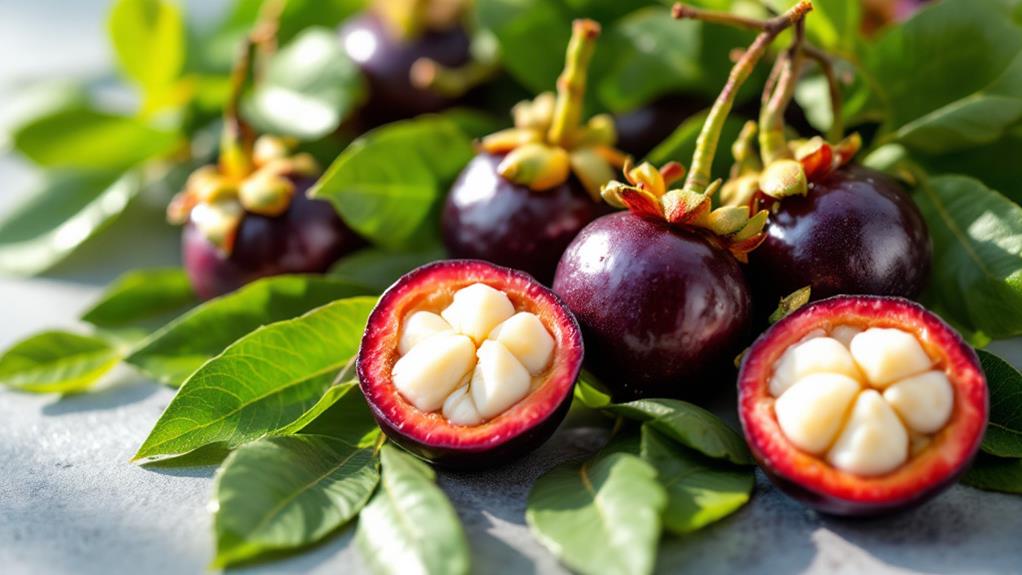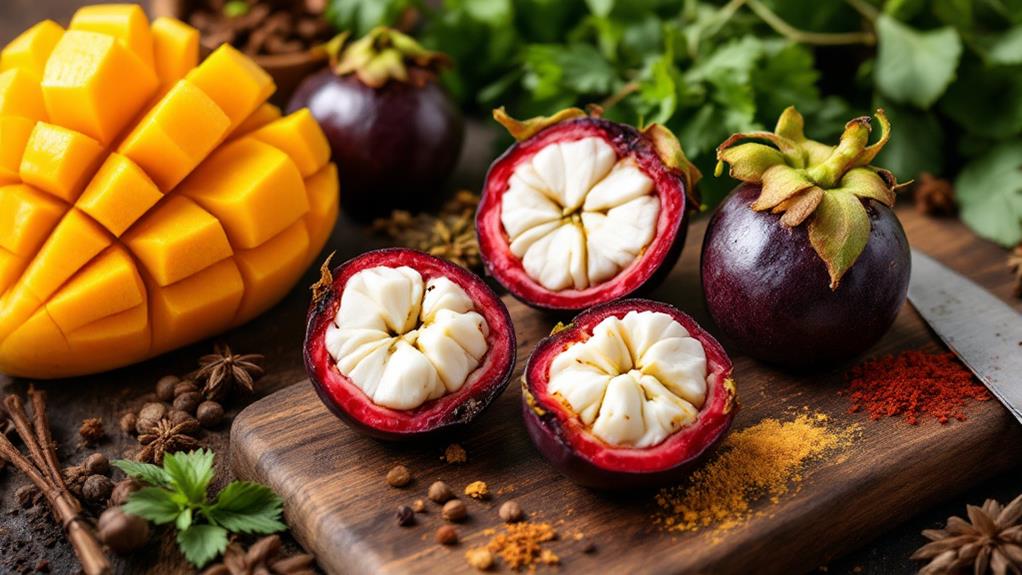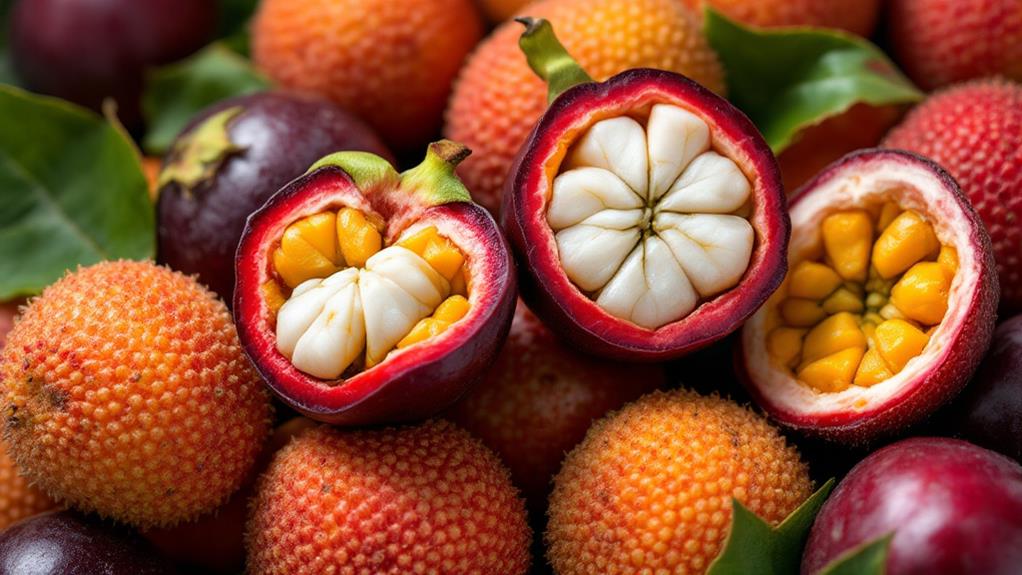Mangosteen: The Queen of Fruits and Its Surprising Health Benefits

You're in for a treat with mangosteen, dubbed the "Queen of Fruits" for its delightful taste and impressive health perks. Native to Southeast Asia, this deep purple fruit packs a punch with antioxidants, especially xanthones, which combat free radicals and may reduce chronic disease risks. Its low-calorie content and high dietary fiber make it a great snack for digestion and weight management. Plus, it supports heart health and blood sugar regulation. While fresh mangosteen shines in fruit salads, you can also enjoy canned or powdered forms. Uncover more secrets about this nutritious powerhouse on your expedition.
Origins and History
Situated in the lush landscapes of Southeast Asia, the mangosteen has captivated people for centuries with its unique flavor and health benefits. Known scientifically as Garcinia mangostana, this fruit has a rich history tied to regions like Java and Sumatra, where it's been cultivated for generations. It's no wonder it earned the regal title "Queen of Fruits" in the 19th century, thanks to Queen Victoria's fascination. Legend has it, she even offered a knighthood to anyone who could bring this exotic delight to England successfully.
The mangosteen's appeal isn't just in its charming nickname. With its striking deep purple rind and sweet, tangy white flesh, its taste is an exquisite blend reminiscent of lychee, peach, and pineapple. This flavor, coupled with its enchanting appearance, quickly made it a sought-after prize beyond its native lands. Despite its name, mangosteen isn't related to mangoes, but it certainly stands on its own, having reached Western shores around 1855. Historically, apart from its delightful taste, mangosteen has been revered for its health benefits, often used in traditional medicine to address multiple ailments. Its rich history and unique qualities make it a true jewel of Southeast Asia.
Nutritional Profile
Packed with essential nutrients, mangosteen is a powerhouse of health benefits. This delightful fruit boasts an impressive nutritional profile, making it an excellent choice for those mindful of their diet. One cup (196 grams) of canned mangosteen fruit contains just 143 calories, making it a low-calorie snack option you can enjoy without guilt. It's not only low in calories but also rich in important nutrients that contribute to your overall well-being.
The mangosteen fruit is loaded with vitamins and minerals that support various bodily functions. For instance, it provides 16% of the Daily Value (DV) for copper, which is critical for maintaining healthy blood vessels and nerves. Furthermore, you'll benefit from 15% DV of folate and 9% DV of manganese, both essential for cell function and bone health. This fruit is also low in fat with just 1.1 grams, and it contains no cholesterol, which is great for heart health.
In addition, mangosteen is a source of dietary fiber with 3.5 grams per serving, aiding digestion. Its Vitamin C content, offering 6% of the DV, supports your immune system, helping you fend off illnesses. Enjoy mangosteen as part of a balanced diet to reap its numerous benefits.
Antioxidant Power

Mangosteen is incredibly rich in antioxidants, particularly xanthones, which play a vital role in neutralizing free radicals and reducing oxidative stress in your body. These xanthones are unique to mangosteen, setting it apart from other fruits. In fact, studies have shown that mangosteen's antioxidant levels surpass those of more common fruits like apples and bananas. This makes mangosteen a true superfood, providing significant health benefits.
By incorporating mangosteen into your diet, you can help lower the risk of chronic diseases such as cardiovascular issues and cancer. The antioxidants in mangosteen support comprehensive cellular health by combating oxidative stress, a major contributor to these conditions. Furthermore, mangosteen's high vitamin C content improves its antioxidant capabilities, supporting your immune function and providing 6% of your daily vitamin C needs per cup.
Regular consumption of mangosteen has also been linked to reduced inflammation, thanks to its anti-inflammatory properties. This is essential for preventing numerous health conditions associated with oxidative stress. By reducing inflammation, mangosteen aids in maintaining a healthier body. So, including mangosteen in your diet not only increases your antioxidant intake but also supports your holistic well-being.
Health Advantages
You might be surprised to learn about the diverse health advantages mangosteen offers. Rich in xanthones, this fruit features powerful antioxidant properties that help neutralize free radicals. By doing so, it may reduce your risk of chronic diseases like cancer and heart disease. Mangosteen isn't just a powerhouse of antioxidants; it also supports weight loss. Studies have shown that incorporating mangosteen juice into your diet can lead to a decrease in body mass index (BMI), helping you shed those extra pounds.
Moreover, mangosteen may assist in managing blood sugar levels. Acting as an alpha-amylase inhibitor, it could benefit individuals dealing with diabetes, much like certain diabetes medications. The health benefits don't stop there. With its significant dietary fiber content—around 12.5% of your daily value in just one cup—mangosteen promotes digestive health and regularity, keeping your system functioning smoothly.
Additionally, mangosteen's anti-inflammatory properties offer potential relief from allergy symptoms and enhance your immune function. While skin care isn't directly mentioned in the provided facts, the comprehensive health enhancement from antioxidants and anti-inflammatory effects could indirectly benefit your skin's appearance and health.
Culinary Applications

Diving into the culinary world of mangosteen, you'll find this exotic fruit adds a delightful twist to a variety of dishes. Fresh mangosteen, with its sweet and tangy white flesh, can be savored by scoring the rind and twisting off the top. It pairs beautifully with tropical fruits like papaya and pineapple, making for a revitalizing and lively fruit salad. If fresh mangosteen isn't available, canned mangosteen in syrup is a convenient alternative. It retains the fruit's unique flavor, perfect for adding a tropical touch to desserts and smoothies.
Incorporating mangosteen juice into your smoothies not only improves the taste and texture but also amplifies the drink's nutritional benefits. Its juicy sweetness makes it versatile, allowing you to experiment with both sweet and savory dishes, including sauces and desserts. For those looking to add a nutritional punch, mangosteen powder is an excellent option. You can easily integrate it into recipes for baked goods or yogurt, improving their flavor and health benefits.
Embrace the versatility of mangosteen in your kitchen, and investigate how its unique flavor can uplift your culinary creations, bringing a taste of the tropics to every meal.
Global Availability
Often hailed as the "queen of fruits," mangosteen enjoys a global presence, despite its roots in Southeast Asia. Thanks to its widespread cultivation in tropical regions like Thailand, Malaysia, and the Philippines, this exotic fruit has made its way into international markets. Fresh mangosteen is mainly available in its native region, but you can easily find canned and frozen versions worldwide. These options have made mangosteen more accessible to consumers outside Southeast Asia, allowing you to relish its health benefits regardless of location.
In recent years, the demand for superfoods has skyrocketed, and mangosteen has secured its place among them. Its popularity in Western countries continues to grow, driven by its numerous health benefits. As a result, you'll find mangosteen in numerous forms, such as juices, powdered supplements, and other health products. Health food stores and online platforms have become key distributors, offering you convenient access to this tropical delight.
Seasonal availability does affect fresh mangosteen supply, peaking from May to September during harvest. Despite this, the introduction of mangosteen to the global market since the mid-19th century guarantees that this fruit remains a staple in the superfood category, reaching consumers worldwide.
Safety Considerations

When considering the safety of consuming mangosteen, it's crucial to acknowledge that whole fruit is generally safe when enjoyed in moderation. The antioxidant activity in mangosteen contributes to your comprehensive health and wellness, but it's significant to be aware of potential concerns, especially when consuming mangosteen juice or supplements.
While mangosteen offers numerous benefits, you should keep the following in mind:
- Concentrated forms like mangosteen juice may contain xanthones, which can affect blood clotting. If you have clotting disorders, consult your healthcare provider.
- If you're pregnant or breastfeeding, there's limited research on mangosteen's safety, so get professional advice before adding it to your diet.
- Discontinue mangosteen supplements at least two weeks before surgery to reduce bleeding risks.
Despite these precautions, enjoying the whole fruit in moderation is unlikely to cause adverse effects. Remember to remove any hard, bitter seeds to avoid discomfort. Mangosteen can be a delightful enhancement to your diet, improving your health and wellness experience. However, always be cautious with concentrated forms, especially if you fall into any of the mentioned categories. Safe consumption guarantees you reap the benefits without any unexpected issues.
Current Research
While it's significant to consume mangosteen safely, it's likewise fascinating to examine the current research that highlights its potential health benefits. Mangosteen's rich content of xanthones, with over 20 compounds identified, shows promising anticancer properties in numerous studies. These potent antioxidants contribute to the health benefits of mangosteen, playing a vital role in fighting oxidative stress and inflammation.
Recent clinical trials have revealed mangosteen's potential in regulating blood sugar levels. Its effectiveness as an alpha-amylase inhibitor is comparable to some diabetes medications, offering a natural alternative for managing diabetes. Furthermore, studies have observed a positive trend in weight management, noting that individuals consuming mangosteen juice tend to have a lower body mass index (BMI).
The antioxidant and anti-inflammatory properties of mangosteen extracts have also been shown to reduce allergy symptoms and inflammation more effectively than certain conventional medications. While ongoing research continues to investigate its long-term impact on chronic diseases, there's growing interest in its role in enhancing immune support. However, further human trials are vital to confirm these promising findings and fully understand mangosteen's potential in enhancing general health.
Comparing Fruits

Mangosteen's unique sweet and tangy flavor often invites comparisons to other tropical fruits like lychee and longan. However, when you explore deeper into its nutritional content, you'll find that mangosteen truly stands out. As a unique fruit, it boasts a high antioxidant content, particularly xanthones, which may even surpass the antioxidant levels found in more common fruits like apples and bananas. This makes mangosteen an appealing choice for those seeking health benefits beyond basic nutrition.
When comparing nutritional profiles, consider these aspects:
- Blood Sugar Control: Unlike lychee, which is higher in sugar, mangosteen offers a lower glycemic load, making it a better option if you're managing blood sugar levels.
- Fiber Content: With nearly 12.5% of the daily value for fiber per cup, mangosteen can help support digestive health and provide a more filling, nutrient-dense alternative to many high-calorie snacks.
- Nutrient Variety: Mangosteen contains significant levels of copper (16% DV) and folate (15% DV), nutrients that are less prevalent in other fruits, enhancing its health benefits.
Dietary Advice
Incorporating mangosteen into your diet can considerably improve your nutritional intake. With crucial vitamins and minerals like vitamin C and folate, a cup of mangosteen provides 6% and 15% of your daily value, respectively. This nutrient-rich fruit supports your general health, making it a valuable supplement to your meals. Its high fiber content, offering 3.5 grams per cup, aids digestive health and promotes regular bowel movements. This makes it a great choice if you're looking to improve gut function and maintain a healthy digestive system.
Mangosteen is also low in calories, with just 143 calories per cup, making it an excellent option for weight management. If you're trying to shed a few pounds or maintain your current weight, incorporating this fruit as a snack can help you stay on track without compromising flavor or satisfaction. Moreover, mangosteen may assist in blood sugar regulation by acting as an alpha-amylase inhibitor, supporting normal glucose levels.
The versatility of mangosteen means you can enjoy it fresh, canned, or as a juice. Add it to smoothies, salads, or desserts for a tasty, nutrient-rich enhancement that complements your health goals.




